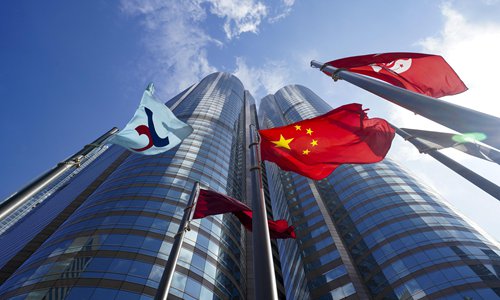HOME >> CHINA
Mainland is HK’s future: HK finance chief
By Zhao Juecheng, Lu Wenao in Hong Kong and Chen Qingqing in Beijing Source:Global Times Published: 2019/9/18 23:23:40 Last Updated: 2019/9/19 0:51:57
City’s finance chief shows confidence in GT interview

Hong Kong Finance Secretary Paul Chan Mo-po. Photo: Lu Wenao/GT
Months-long social unrest has dampened Hong Kong's prospects, as the city has been struggling with cooling business, housing woes and limited opportunities for the youth. When foreign investors raised questions about the future of this international trade and financial hub, a top Hong Kong finance officer said the city could overcome the downturn only by deepening cooperation with the Chinese mainland.
The trade war launched by the US against China, in addition to the ongoing social turbulence, seriously weighed on the momentum of Hong Kong, as street protests take a toll on various sectors ranging from tourism to retail, and it may even become worse in the third quarter of 2019, Hong Kong Finance Secretary Paul Chan Mo-po told the Global Times in an exclusive interview on Wednesday.
"It's possible that the third quarter GDP will continue to decrease, considering tepid business activity in tourism, retail and restaurants. If it continues shrinking, the city may enter a recession in technical terms," Chan said, noting that it also depends on whether the social unrest eases soon.
Economic conditions in the first half of 2019 were the weakest since the 2009 recession, and the local economy faced significant downward pressure, according to second quarter GDP results revealed in mid-August. Pillar industries including services, tourism, finance, logistics and real estate have all felt the chill in recent months.
The number of tourists to Hong Kong slumped nearly 40 percent in August - a peak tourism period, and the hotel occupancy rate in some districts dropped by over 50 percent, with the outlook of those sectors remaining worrisome, according to Chan's earlier blog post.
Services account for about 90 percent of Hong Kong's total GDP, according to official data. And the small and medium-sized enterprises (SMEs) have bore the brunt of the business downturn, as they comprise 98 percent of Hong Kong's companies, and account for 45 percent of Hong Kong's labor force.
To ease the pain of SMEs, the authority has taken measures worth HK$19.1 billion, Chan said. "The goal is to ensure the stability of the job market, which will ultimately help stabilize the economy."
In addition to measures that have been unveiled, we are also evaluating the situation and will put additional measures if necessary, said Chan.
Mainland-HK ties
Rising challenges also affected business sentiment, as foreign investors questioned whether Hong Kong could maintain its status as a global financial and trade hub when radical rioters disrupt public transport, attack police officers and ordinary citizens, which seriously damages the city's reputation as a society ruled by law.
Two major ratings agencies even downgraded Hong Kong's credit rating at such a critical moment, warning that closer ties between the Chinese mainland and Hong Kong may pose greater challenges and even erode its institutional strengths.
"We don't agree with such speculation," Chan said.
"Close connections to the mainland is effectively one of our major advantages… and our future development will center on unleashing our potential based on 'one country, two systems' principle and integrating with the mainland's development plan," Chan said.
Hong Kong is an active participant, contributor and beneficiary of the mainland's 40 years of economic reform and opening-up, the finance secretary noted. "During this process, our society has experienced continuous restructuring… and we have been adjusting our own development, hoping to serve the needs of the country with our advantages," he said.
At the earlier stage of economic reform, cheaper land and labor in the mainland attracted many Hong Kong factories. As mainland industries grow, the city saw its finance and services sector further grow to meet the needs of the development.
"For instance, Hong Kong would not have become a global financial hub without mainland companies. Take the Hong Kong Stock Exchange, Over half of over 2,000 listed companies are from the mainland and nearly 80 percent of transactions belong to them every day," Chan said.

The Hong Kong Stock Exchange building. Photo: VCG
Social and economic issues
Still, it has become much more urgent for the HKSAR government to tackle social issues, as some have been exacerbated by longstanding economic woes like housing problems and limited opportunities for the younger generation.
"The SAR government realizes that housing is the most pressing problem, and we will do everything to solve it," Chan told the Global Times.
The HKSAR government is now pushing for a vacancy tax bill that could see a more affordable property market in the city, with the proposed bill needing to go through the Legislative Council (LegCo) before becoming a law. The first regular LegCo meeting will only resume next month, after rioters vandalized the LegCo facility in July.
"We have been promoting vacancy tax since June last year. It aims to make already-built houses more available to the public, no matter for rent or for sale," he said.
To tackle the supply-and-demand issue, Chan also said that the government is going to resume more land to build public houses, with a planned resumption of over 700 hectares in the next five years. And reclaiming more farm land is also being considered.
"The Chief Executive's government report in October will lay out more specific measures to accelerate this process," he said.
Many black-clad protesters who hit the streets of Hong Kong are young people, some even teenagers. When the public was confused about why they constantly fight the government, some complained about the lack of opportunities, which will eventually lead to an unhappy future.
Chan noted that Hong Kong's industries lacked diversity in the past, relied heavily on finance, real estate and trading, which did not offer enough choices for the younger generation to develop.
"The younger generation has different interests compare to their older counterparts," Chan said. "We have started to promote creativity in technology, culture and sports."
Hong Kong has also started to establish incubator programs in cooperation with mainland cities, including adjacent Shenzhen.
"Though the number is not big, some young Hongkongers are starting businesses in the mainland," Chan said.
"Hong Kong's advantage is its scientific research in universities, while mainland cities have an established manufacturing industry. That's where we can work on to benefit both Hong Kong and the mainland."
"The mainland and Hong Kong are complementary, and cooperation on scientific innovation has already become a good example of this," Chan said. "The central government has said it would make Shanghai an international financial hub, but it is not a threat to Hong Kong. We can utilize each others' advantages to progress together."
He also noted that Hong Kong should continue to improve its competitiveness and be strategic.
"We should not be afraid of competition, but be afraid of incompetence," he said.
Newspaper headline: Mainland is HK’s future
Posted in: HK/MACAO/TAIWAN